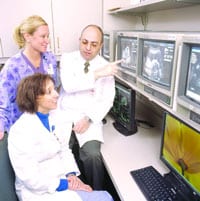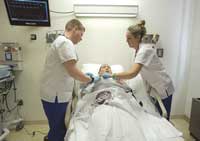First Response Trimester Screening Program Provides Patients with Answers Early in Pregnancy
The Test
The first trimester screen calculates a woman’s risk of delivering a child with Trisomy 21 (Down syndrome), as well as Trisomy 18/13, by interpreting results of both an ultrasound and blood test. The ultrasound, which measures fetal neck thickness (called nuchal translucency, or NT), is performed between 11.0 and 13.9 weeks of gestation. A simple blood stick test, typically performed the same day as the ultrasound but available as early as the ninth week of pregnancy, checks the blood for levels of pregnancy-associated plasma protein A (PAPP-A), and free beta human chorionic gonadotropin (free Beta), and Alpha-fetoprotein (AFP). Data from the ultrasound measurement and blood test is analyzed and returned to the patient’s obstetrical provider within a few days.
Results do not confirm that the fetus has a chromosomal disorder, but calculate risk in the form of a number. The average woman at 35 years of age with no other risk factors has about a 1 in 273 chance of having a baby with Trisomy 21. A result such as 1 in 200 or 150 would indicate the patient is at an elevated risk. In addition, elevated NT measurements are associated with cardiac abnormalities in the fetus and possible complications later in pregnancy.
After receiving the results, patients discuss the findings with their physician. If they are found to be at no elevated risk, they do nothing and are able to continue their pregnancy with alleviated anxiety. Patients at an elevated risk are typically referred for genetic counseling as well as a diagnostic test such as chorionic villus sampling (CVS) or amniocentesis. In other patients, a fetal echocardiogram or closer monitoring of the pregnancy may be suggested. Whichever step is taken next, the first trimester screen provides patients with information and answers significantly earlier than in the past.
Establishing the Program
Dr. Bsat set out to establish the First Trimester Screening Program at Baystate Medical Center in 2002 after reviewing study findings on the accuracy of the first trimester screen.
“An increasing amount of published data became available to the Fetal Medicine Foundation in Europe, and later in the United States, indicating that screening women between the 11th-14th weeks of pregnancy for Trisomy 21, and more recently 18 and 13, was producing a comparable or even better detection rate than the tradition triple or quad screen test,” says Dr. Bsat.
The first trimester screen’s detection rate is 85-90 percent for Down syndrome and 97 percent for Trisomy 13 and 18; the quad screen’s overall detection rate is about 70 percent. The false positive rate in detecting Down syndrome for the first trimester screen is also lower — about 4 percent rather than 5-7 percent for the quad screen.
A vital first step to establishing Baystate’s program was ensuring all staff are certified by the Fetal Medicine Foundation to perform the highly detailed ultrasound measurements that are critical to determining the risk of chromosomal anomalies.
“All of our ultrasonographers and physicians have been trained and certified in measuring and interpreting nuchal translucency,” says Dr. Bsat. “This is essential because measurements that are just slightly off can lead to false results. We also achieved certification by the Maternal-Fetal Medicine Foundation, which is the United States certifying entity within the Society for Maternal-Fetal Medicine (SMFM). These certifications are renewed annually by an outside audit of our ultrasound images and confirmation of continued competency in obtaining correct NT measurements.”
Another factor critical to the program’s success was integrating a range of services, including Genetics, Laboratory, Ultrasound, and Access Services, which schedules the test. Despite the initial complexities, the end-benefit for patients — coordinated care and access to a comprehensive offering of services in one location — is clear.
“Nowhere else in Western Massachusetts can patients go to one place to have the first trimester screen performed, as well as to receive genetic counseling and have diagnostic tests available this early in pregnancy,” says Dr. Bsat.
Providing Options and Answers
Patients who learn through the first trimester screen that they are at an elevated risk have the opportunity to make decisions about their pregnancy earlier. While some may decide to do nothing, all are referred to genetic counseling and may chose to undergo an extensive genetic evaluation.
Genetics counselors at Baystate meet with patients to review their history, explain the potential condition and its implications, and discuss next steps, such as undergoing CVS or amniocentesis.
“While screening tests may show they are at an increased risk, that does not mean the fetus actually has the condition,” says Gabriel Cohn, MD, chief of Clinical and Reproductive Genetics at Baystate. “The only way to know with near absolute certainty is to perform a diagnostic test.”
Baystate Medical Center is the only provider in Western Massachusetts to offer CVS, which involves taking a tiny biopsy from the placenta and is better than 99 percent accurate at diagnosing chromosomal abnormalities.
“Additionally, if the first trimester screen indicates an increased risk for fetal cardiac abnormality, we are the only hospital in the region to perform fetal echocardiograms and will assist in coordinating that service as well,” says Dr. Cohn.
The first trimester screen appears poised to become a standard test offered to all pregnant women as an alternative to second trimester quad screen. Until then, staff at Baystate are focused on increasing awareness and clarifying what the test entails.
“There are some misconceptions that this test is for high-risk patients,” says Glenn Markenson, MD, chief of Maternal-Fetal Medicine at Baystate. “The first trimester screen is ideal for patients not previously assumed to be at an elevated risk. Certain patients, such as those over 35 or with certain medical histories, are already assumed to be at an elevated risk. This test provides an earlier opportunity to also capture the low-risk population and identify if an increased risk is actually present.”
Kathy Troczynski, RN, perinatal nurse coordinator for Baystate Maternal-Fetal Medicine, coordinates the booking of first trimester screens and has been assisting in educating community providers about the test.
“Our patients have been asking for the first trimester screen,” she says. “They’re excited to learn it is available and that they will be able to receive answers sooner.”
For more information about the First Trimester Screening Program, call Maternal-Fetal Medicine at 413-794-3470. To refer a patient for a first trimester screen, call Access Services at 413-794-2222.


